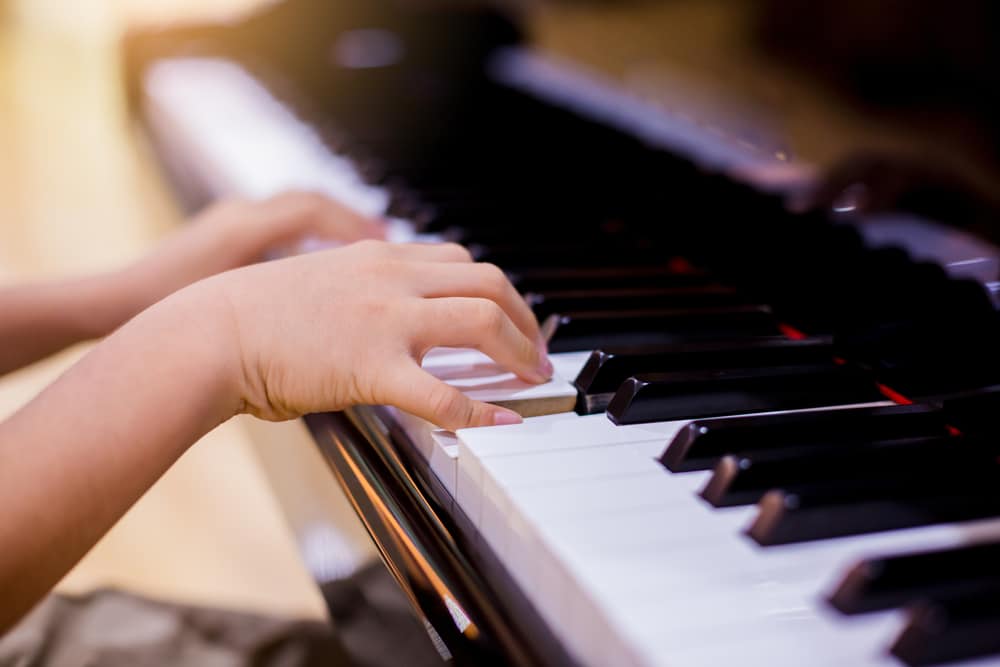
However, even though you are never too old to learn piano, some experts say that some individuals are too young. If your child starts tinkling the ivories at the age of two, then you have a genuine child prodigy on your hands. However, according to teachers at a piano academy, most children do not have the neurological development Trusted Source Brain Development and the Role of Experience in the Early Years Research over the past several decades has provided insight into the processes that govern early brain development and how those processes contribute to behavior. www.ncbi.nlm.nih.gov or finger dexterity to start playing piano before the age of six. Often the child will reveal their interest in playing the piano by telling you or exploring the keys. Playing the piano can help your child develop a general interest in culture, build self-confidence and encourage creativity. Practicing every day teaches your child the rewards of discipline. However, this can become an exercise in frustration for a child without developed cognitive and physical abilities, and they can become frustrated and give up.
Before your child starts piano lessons, there are several important things to consider, including the child’s hand size, dexterity, reading comprehension, and enthusiasm to learn music.
An interest in learning and playing is paramount, or your child will feel forced into this activity. Many younger children cannot tolerate or comprehend concepts such as “practice makes perfect.” The best age to start learning piano is when the child demonstrates an ability to focus along with some music appreciation, which is usually around the age of six. If your child is dancing at a young age, knows tall of the lyrics of popular songs, or sings along to commercials, then they might be ready at a younger age, but usually, a child has been exposed to the benefits of music appreciation by Grade One. Once in school, most young people are familiar with how music can encourage interaction with others and encourage dancing, self-confidence, and memory retention.
If your child does express interest in playing the piano before the age of six, there are all kinds of music programs available for preschoolers that you can use with a new digital piano, including Kindermusik that is designed to supercharge early childhood brain development and introduce children to concepts of rhythm, percussion, and pitch.
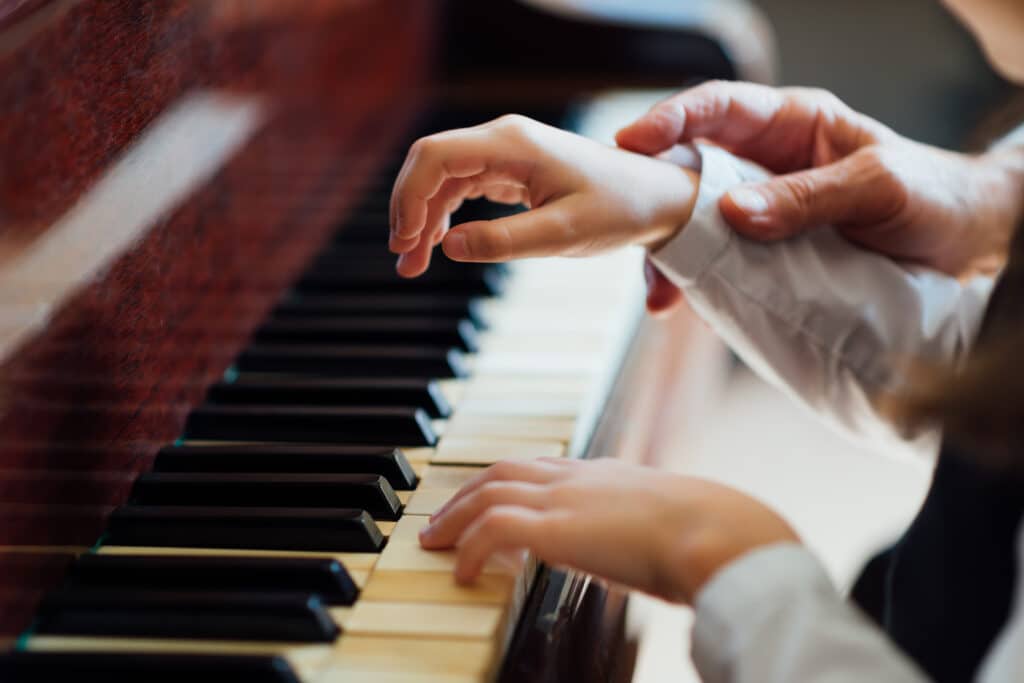
If your child can’t easily place five fingers on five adjacent keys, then they are likely too young to start playing the piano. If your child has large hands, that is a good sign, especially if they can stretch their fingers an entire octave, which would be eight adjacent white keys. If your child is unable to do this, then don’t frustrate him or her as you don’t want the child to associate music lessons with frustration.
Finger independence is another word for finger dexterity. Basically, it means that your child can move one finger of a hand without moving any other fingers in tandem with it. Have your child hold up five fingers and wiggle them separately and independently, one at a time. The best age to learn piano is when they can do this. By the way, some individuals grow into ability without the ability to move one finger without the others; for instance, they may not be able to move the baby finger without moving the fourth finger without moving the baby finger as well. This can happen if you have rheumatism, arthritis, or simply inherited a tendency not to be that dexterous. This article about adult finger independence will take you through some exercises needed to develop true dexterity.
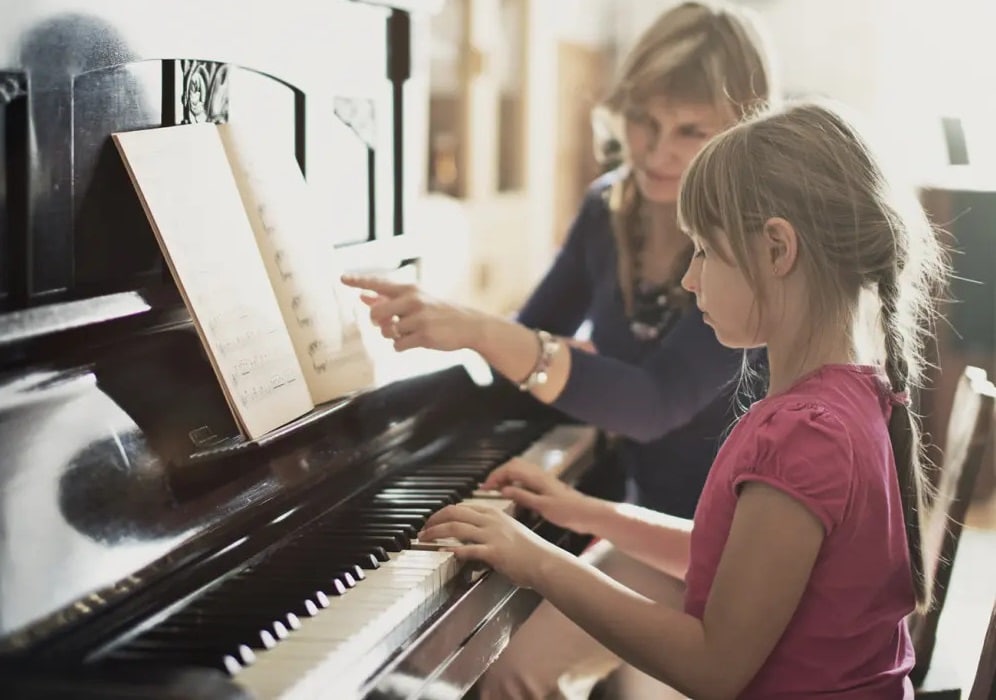
Although many talented young people can pick out tunes with a single finger by ear, the best age for kids to start piano lessons is after they have started reading. Some children can pick up the reading of musical symbols before they have learned to read text, but generally, it is best to wait until they have learned how to read before they learn how to play the piano. If you have an early reader at the age of three or four, they might already be at their best age to start piano lessons.
You are never too old or too young to learn how to play piano, although the consensus among piano teachers seems to be that it is best to be over six years old. There are all kinds of benefits to learning this musical skill, including developing confidence on stage, positive responses to criticism, improved coping with stress, better study habits, and better social interactions. The sooner you start them off, the better but make sure that they have the finger independence, reading capability, and hand size needed to begin this journey.
The good news about learning piano is that it can actually accelerate your child’s learning ability, especially if you decide to start them off between the ages of two and seven. However, kids younger than five may only be able to understand the piano keys as percussive instruments, basically the keys “drums in different tones that they can pound away at with two fingers. A good example of this would be the song “Chopsticks.” One of the benefits of children starting piano lessons early is that it can help them develop better grades in school. However, aside from being at an ideal age, you have to ask yourself whether or not you have the time and energy to put into piano lessons and the money to put into buying the necessary equipment.
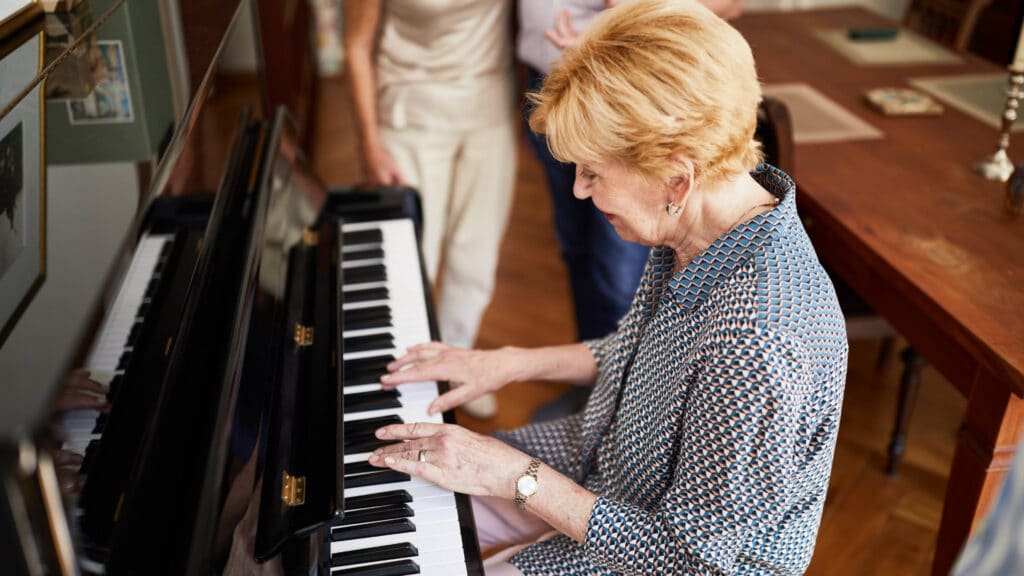
Adult beginners may benefit considerably from the social interaction and approval that can result from learning to play the piano well. The person who can play the piano well is often the person who is often invited to parties. You might have to be patient with yourself, especially if you have lost some finger independence Trusted Source The Piano Finger Independence Challenge - Free Online Piano Lessons Finger independence means your fingers do what you want them to do (instead of their own thing). This challenge will build your finger independence. www.pianote.com due to issues like neuropathy or arthritis. However, piano playing can help improve these conditions. As is true with the parents younger players, you need to ask yourself if you have the time and energy to devote to lessons and if you have all of the equipment in places such as a portable or real piano and a comfortable adjustable stool so you can maintain the correct posture while playing. If you are an older beginner piano player, then it is also important to take it easy on yourself. Yes, it is going to take you longer than a child (in most cases) to learn the piano as our brains are at peak learning capacity between the ages of 2 and 11. Otherwise, playing the piano is a great way to improve your music appreciation and your memory and cognitive abilities.
If you are an adult who is taking piano lessons so that you can play at your local church, then practicing on a weighted keyboard is best. It is also a bonus if you can get a piano that has that digital church organ sound. This article here lists the ten best keyboards for worship, with strings and pads to help accentuate your sound.
Remember that the best age to start piano lessons may have a lot to do with whether or not there is a piano in your home, as many piano teachers want their students to practice for an hour or more every day. The good news is that you no longer have to have a baby grand piano or full-sized upright in your home to give your child access to learning music. Yamaha makes an amazing portable keyboard with a full 76 keys and also with USB and MIDI capability. If you want to play on a smaller portable keyboard with the feel and sound of a real acoustic piano, consider getting a compact piano with weighted keys such as the Yamaha 88 Key Weighted Action instrument. This type of piano has weights in the keys that help make the transition from playing an electric piano to an acoustic piano easier because the keys feel the same as a real piano.
There are quite a few great things about these portable keyboards. One major plus is that they allow your child to be taught piano using a computer program as you can connect them to a learning program on a computer. Also, because they are portable, you can take them on the road, and your child will never miss a day of piano practice. As they are smaller than the usual piano, they also fit into smaller living spaces such as condos. Yet another advantage of buying a portable keyboard like the above two mentioned is that they can be used with earphones so that you can enjoy a quieter household.
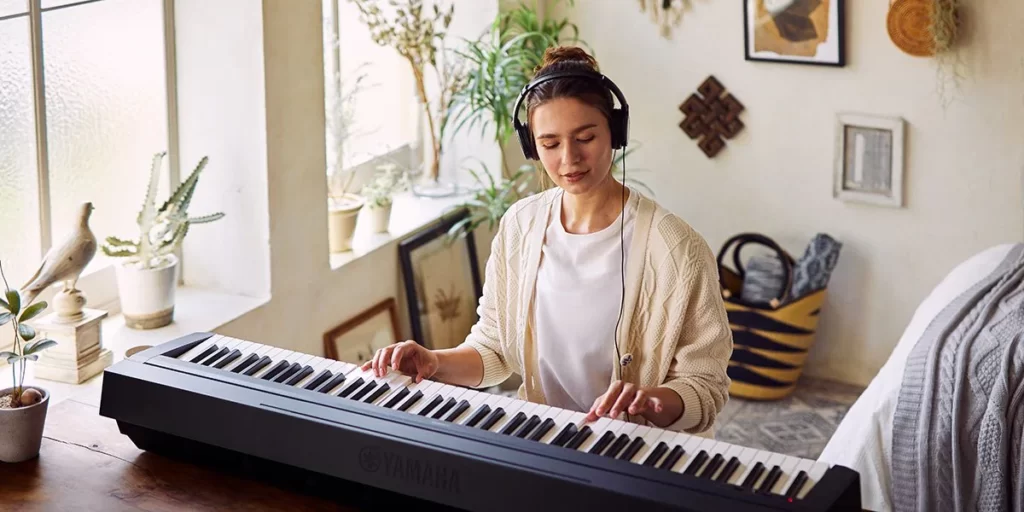
Some children really enjoy using their new portable keyboard as a percussive instrument. Many newer keyboards have gongs, cymbals, and back drum beats that can be accessed with cymbals, gongs, and other features. Here is an interesting article about how pianos can be classified as being both a percussive and a keyboard instrument.
The age at which your child will start piano is going to depend on a few factors, including whether or not you actually own any kind of piano and whether or not you can actually afford to buy one. If you are on a budget, this comprehensive article lists 10 of the best portable keyboards on the market. After you get the piano in place, make sure that you have an adjustable piano stool to go with it. It is also a good idea to procure any sheet music required and to pick out some choice videos on YouTube that can let your child hear how a song that he or she is learning sounds when it is played properly. The consensus is that the best age to start piano lessons is probably between the ages of 6 and 11, but of course, you can be a lot older before starting your first lesson, as long as you have the enthusiasm and desire to learn a new performance skill.